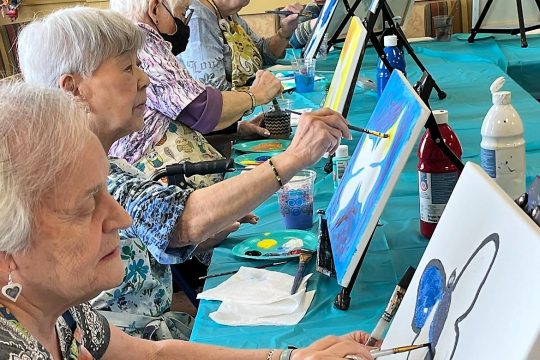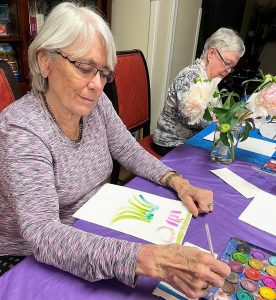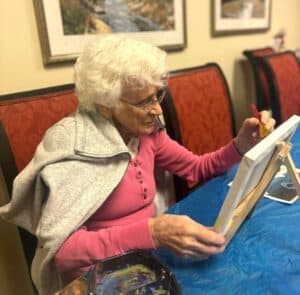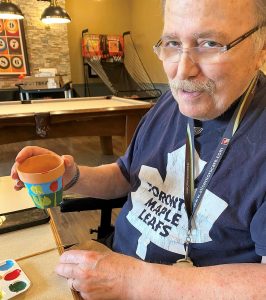
We all know that creating art can bring great joy and satisfaction, but did you know that nurturing your inner artist can also have profound benefits for your health? Whether you’re a seasoned painter or just picking up a brush for the first time, painting is a wonderful activity for older adults. It’s not just about creating something beautiful—it’s about fostering connections, improving mental health, and finding personal fulfillment.
From sparking feelings of joy to forging connections with friends, here are some surprising reasons why creative arts like painting is a great activity that you won’t want to miss.
Why Painting is a Great Activity for Older Adults
Have you ever noticed how relaxed you feel after spending time on a creative activity? That’s because engaging in art like painting has immediate, tangible benefits for both your mind and body. Whether you join a painting class or take part in a casual session with friends at your retirement residence, painting for older adults is not only fun but also a great way to boost your mood and connect with others in a meaningful way.
Some proven benefits of painting for seniors are:
- Provides a sense of accomplishment
- Increases self-esteem
- Reduced stress and anxiety
- Improves mental health and mood
- Stimulates focus
- Improves memory and cognitive function
- Enhances fine motor skills and coordination
- Increases communication and socialisation
- Offers sensory stimulation
- Helps express feelings nonverbally
- Reduces perception of pain
- Reduces boredom.
One of the greatest rewards of painting is the sense of satisfaction that comes from creating your own piece of art. Looking at your finished work, knowing that you created it, can be incredibly uplifting and may even transform your entire day.
Benefits of Painting for People with Dementia
 The benefits of painting for seniors experiencing cognitive decline or dementia are immediately evident and fulfilling for loved ones and caregivers.
The benefits of painting for seniors experiencing cognitive decline or dementia are immediately evident and fulfilling for loved ones and caregivers.
When older adults experiencing cognitive decline engage in art activities, it helps boost cognitive function, stirring memories, encouraging conversation, and even evoking nonverbal expressions like smiles or laughter. This means that painting for seniors with dementia offers a special way to connect and communicate with caregivers and family members.
Are you looking for ways to stimulate your mind? Research has shown that “people who engaged in artistic activities, such as painting, drawing and sculpting, in both middle and old age, were 73% less likely to have memory and thinking problems, such as mild cognitive impairment, that lead to dementia”.
In fact, studies show that Alzheimer’s disease often spares the areas of the brain associated with creativity and emotion, making painting a powerful tool for enhancing quality of life.
Tips to Painting with Older Adults
If you’re ready to start painting, here are some simple steps to engaging older adults – and older adults experiencing cognitive decline – in a painting activity, whether at home or in a group setting.
1. Warm up with simple exercises.
Before you start painting, it’s a good idea to do a short warm up. Play some music (you can even sing along) to help stimulate memory and creativity. Next, swing your arms and stretch your fingers. Remember the “Here’s the church” nursery rhyme? Give it a try! (It’s also a great arthritis exercise for seniors with hand pain.)
2. Reminisce with pictures.
Next, look at some photos and paintings for inspiration. If you are painting with an elderly loved one with dementia, ask them to describe the images. Ask if the images bring up any memories. This will help with recall and practice verbal skills.
3. Start painting.
Finally, get out your art supplies and start painting. Copy an image or paint whatever you want, whether abstract strokes or a simple landscape. If you are with friends, family, or caregivers, hold a conversation throughout the activity, discussing the creation and reminiscing on memories that may be triggered.
More Tips for a Successful Paint Activity
- Keep the project on an adult level. Don’t make it too challenging but avoid something child-like that might be demeaning.
- Provide basic instruction and assistance. Older adults may require support such as help starting the brush movement.
- Use safe paints and materials; avoid toxic substances.
- Allow plenty of time, remembering the project doesn’t have to be finished in one sitting.
- Seek out virtual painting classes with the one’s offered by the Art Gallery of Ontario!
Painting Classes in Retirement Living
If you’ve always wanted to learn how to paint, it’s never too late to learn. No matter your skill level, develop your artistic side and try something new to challenge your creativity!
Independent living, assisted living, and memory care communities at All Seniors Care recognize the endless benefits of being creative, which is why our residences incorporate painting into their health and wellness programs.
Here are some ideas from our retirement homes in Ottawa and Regina senior care homes to get you started.
Painting for relaxation
- Paint to music
- Work on a paint-by-numbers
- Paint with calming colors
- Finger paint
Paining for happiness
- Paint terracotta pots
- Abstract painting
- Tape painting
- Create a stained glass painting
Therapeutic art projects
- Draw or paint emotions
- Create an art journal
- Paint faces on masks
- Create an emotion wheel
- Paint memorial rocks
- Make a remembrance ornament
Healthy Aging Through the Arts
 Painting classes, crafting sessions, and flower arranging are offered at ASC a senior residence near you – and everyone can take part in the fun. No matter your skill level, it is an opportunity for you to develop your artistic skills and try something new!
Painting classes, crafting sessions, and flower arranging are offered at ASC a senior residence near you – and everyone can take part in the fun. No matter your skill level, it is an opportunity for you to develop your artistic skills and try something new!
At All Seniors Care, we know that keeping seniors active and connected is vital. And that fun is best had in groups. At our senior living centres, friends come together for music, art, and social events that are always happening alongside of physical activity and life enrichment. Contact us today to see how we can help you or a loved one find the perfect balance between care and community. Our goal is for older adults to lead active, happy, and fun-filled lives in retirement.
Originally posted on
Writer – Julianna McLeod
Julianna is a health and wellness expert at All Seniors Care. Her mission is to create content that empowers seniors to form sustainable solutions for lasting health and happiness. She is an experienced writer, editor, and Recreational Therapist living in Toronto.

